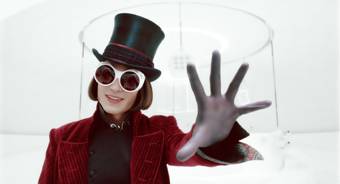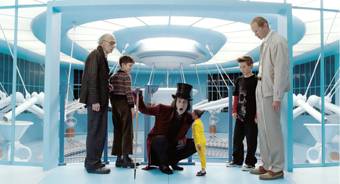"So
shines a good deed in a weary world..." |
Gene Wilder as Wonka in
Willy Wonka and the Chocolate Factory (1971)
|
There
are several reasons to revel in Burton's direct take
on Roald Dahl (these two men's art had to intersect
at some point - as it has done indirectly with Burton as
producer on James and the Giant Peach – they hail from the same darklight DNA) but to my mind, two
words describe why the experience of watching this colourful
fantasy is so beguiling; Johnny and Depp. His recent choices
have been crowd pulling bull's eyes. He is the epitome
of the experimental actor who risks abject failure with
each outing and still manages to soar. He's having
a good run and another outing for Pirates of the
Caribbean's Captain Jack Sparrow would go
down like a cold Snozberry Wonkashake in a guilt free world.
In
the tiniest of ironies, the original 1971 movie version
of this classic of children's literature was resolutely
Charlie Bucket's story and yet the name 'Charlie'
(from the original Roald Dahl tale) was replaced by 'Willy
Wonka', the more flamboyant character. In Burton's
version, the original title now in place, the movie story
is actually Wonka's own. Of course, we're all
rooting for Charlie but he and his family are really ciphers,
goodness through and through offset by bloated (in one case
literally bloated) caricatures of the worst human traits
sharpened by the excesses of surreally spoilt childhoods.
All four kids get their comeuppance as five lucky winners
get to tour Willy Wonka's Chocolate Factory with Willy
as their guide. We all know Charlie's going to win
but again, it's the ride we enjoy, not the mystery.
Any of that has been handed to Wonka by giving him a Freudian
raison d'etre. At one flashback to his dental nightmare
of a childhood, we return to Willy who apologises to his
group for having had 'a flashback'. This is
noughties' post-modernism with a spin and it's
welcome because it's actually funny. In another wonderful
subverted nod to cliché, Willy (as a child) runs
away from home and we see a parade of flags (movie shorthand
for all the countries he's visited) before it's
revealed that he has just walked though a flag museum –
priceless.

I
laughed out loud three times (rare) and at a remake of a
movie and story I know so well (even rarer). And it was
always Depp. As outsiders go, working from within the system,
Burton and Depp make a damn fine double act. The results
of their pairing never produced a bland Hollywood feature
(take a bow Planet of the Apes. Tim, what
was on your mind apart from Helena B-C as a curiously sexy
chimpanzee?) Burton and Depp's pairing is the nineties'
and noughties' pop-cultural, multi-coloured antithesis of
the darkness of Scorsese and DeNiro. It's a relationship
in which each partner fires off each other creatively coming
up with work that is greater than the sum of the parts.
And
the sum of the parts played by Depp under Burton's direction
is a worthy roster to anyone's CV. Depp's haunting isolation
as Edward Scissorhands, his buoyant cheerfulness
as Ed Wood and his bumbling, prone to passing
out, Victorian constable in Sleepy Hollow.
These are gentle and affecting character studies never less
than wonderfully entertaining. Considering his overly scarlet
demise in A Nightmare on Elm Street (there was a lot of blood), Depp has never played violent
characters in violent and 'gritty' movies. Add to this,
he lives in France (of all places for an American actor
to live) and keeps grounded and seems far above the pettiness
of the pernicious dream factory. He is also a superb character
actor stuck with the body and face of a movie star. He does
his best to downplay his looks with a series of interesting
make up, costume and hair choices (let's not forget Sparrow's
ear-rings) but he can also pull off naturalistic with aplomb.
He was extraordinary in Finding Neverland (because he did so little for maximum effect, the Holy Grail
for most actors).
And
here he is having to squeeze into the shoes of Gene Wilder's
crusty but benign interpretation of Wonka (that phrase is
© Paddy Chayefsky by the way. See Network and revel). He does what Depp does; he experiments, roots
around and finds the character as pigs detect truffles.
A lot has been said about his Keith Richards inspired Capt.
Jack Sparrow. Depp acknowledged this but in an attempt to
fathom the actor's inner workings, according to critics,
he's now supposed to be aping Michael Jackson as Wonka.
I can't buy this for a second. His is an original take on
a ludicrously over the top fantasy character and he not
only gets away with it, he is the maypole around which the
design of the movie dances. His pale face and surgical gloves
are given some explanation and while I revelled in Depp's
performance, his voice was definitely reminding me of someone's,
another performance by an actor taking an interesting risk.
It came to me hours later at a barbecue in South Wales but
I'm sure it was an influence. Wonka talks almost exactly
like Dustin Hoffman's Tootsie, that airy,
mid toned, feather delivery that every now and again darts
out a curmudgeonly one-liner. As mentioned, this is Wonka's
movie and the only time the film trips over itself is at
the dénouement, changed from Dahl's original and
very different from the sweet and emotionally satisfying
punch delivered by Wilder's line (quoted above) as his hand
curls around Charlie's returned everlasting gobstopper.

There
has to be an alter-ego effect built in to any artist's
work when he/she re-casts the same actor. Truffaut had his
Jean-Pierre Léaud , Ford had his Wayne and as mentioned
Scorsese had his DeNiro. Depp plays aspects of Burton's
character, markedly sartorially different. Burton, now in
middle age, has put on a few pounds but hasn't changed
his wild hair nor penchant for black. Wonka is immaculately
coiffeured throughout and dressed to thrill. All of Burton's
trademarks are in place though the actual factory seems
more like a slight updating a la Burton of the 1971 factory
set. There is a dark edge to the movie which is most welcome
(only literally whipped cows can make whipped cream) and
it's in these darker areas, the film scores most hits
not to mention the cow's raw hides. In the 1971 version,
there is a real chicken (subliminally featured but it's
there) decapitated on the walls of the boat ride tunnel
and going in to Burton's take on Wonka, I hoped for
dark amidst what had to be a vividly colourful experience.
I wasn't disappointed. Before we see Wonka (it is
a great introduction) we are treated to a cheesy animated
collage of badly animated animatronic figures singing Wonka's
praises (composer Danny Elfman in full Pee-Wee Herman mode).
I thought 'Mmm, not sure about this…'
and as soon as I'd finished expressing my inner misgivings,
one of the figures bursts into flames and the whole cheesy
panorama of puppets suddenly became very funny, a burning,
exploding monument to the genius of a man whom we see revealed
in a wonderful camera move (it's simple but timed
to perfection).
Perhaps
the most identifiable and quoted aspect of the 1971 version
is anything to do with the Oompa Loompahs, Wonka's
diminutive workforce played by several (reportedly rowdy)
actors of diminished size. Burton made a good decision and
cast one actor (Deep Roy) and digitally replicated him throughout.
The lyrics to the songs (despatch a kid in keeping with
his or her character flaw and then sing about their irredeemable
awfulness) are direct lifts from Dahl's book. It's
a credit to Burton he didn't try to update the 'Ooompa
Loompa, dippety doo' songs because they probably wouldn't
have worked in 2005. Instead we get a series of ever whacky
pastiches and montages from all manner of pop culture rock
video formats. Due to the mix (or the cinema in which I
saw it), the lyrics were never easily discernible but we
got the point.
One
of the four brats, Mike Teavee, has been updated to a videogamer
and his fate is to be cast inside a TV living the reality
of whatever's on the box at the time. Here's where Burton
high wires it (and falls once or twice for my money). Instead
of generic TV clips, we get long clips from some very 'classic'
movies. The black monolith from the never bettered 2001:
A Space Odyssey is replaced by a Wonka bar with
'Also Sprach Zarathustra' accompaniment. Is it me or did
that feel a tad disrespectful (or has Burton got the pulse
of the teen audience who don't mind seeing cinematic landmarks
trashed?) I am willing to bet that if he were still with
us, Stanley Kubrick would have denied permission to use
the clips. It's not as if this was a sloughed off reference.
It IS 2001 on screen, 'Dawn of Man' apes
and all just as a few other shots are from the original Psycho. True, the Oompa Loompahs infiltrate
the clips but the lengthy 2001 extract
for me was (forgive the reference) too close to the bone.
Where
the movie promises an emotional catharsis, it briefly falters.
Charlie's victory over the other children is brushed aside
(the tear inducing wallop of the 1971 version). What Burton
concentrates on here is Wonka's need to have some sort of
paternal absolution with Charlie's help. It comes in the
form of clipped newspaper evidence on the walls of his father's
house but it's curiously out of step with the rest of the
film and we realise that Wonka is simply after what most
of us yearn for – belonging. But despite the ending, Charlie and the Chocolate Factory is top
notch fantasy entertainment. Depp gives another quirky,
experimental performance which drives the movie along in
his wake. Burton's direction is assured in his familiar
milieu of the fantastic and the cast acquit themselves with
earnest pathos and integrity. But ultimately, the movie,
quite rightly, belongs to Johnny Depp.
|